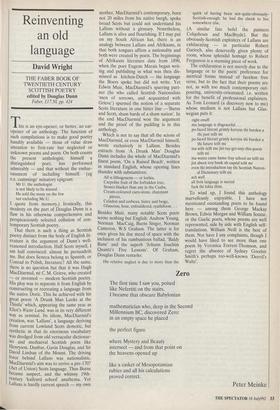Reinventing an old language
David Wright
THE FABER BOOK OF TWENTIETH CENTURY SCOTTISH POETRY edited by Douglas Dunn Faber, E17.50, pp. 424 his is an eye-opener, or better, an ear- opener of an anthology. The function of such compilations is to make good poetry handily available — those of value draw attention to first-rate but neglected or unknown poems and poets. On both counts the present anthologist, himself a
distinguished poet, has performed admirably — and that without the embar- rassment of including himself. (eg e.e. cummings' minatory epigram:
Mr U. the anthologist is not likely to be missed.
He sold the many on the few not excluding Mr U.
I quote from memory.) Ironically, this modesty on the part of Douglas Dunn is a flaw in his otherwise comprehensive and perspicaciously selected collation of con- temporary Scottish poetry.
That there is such a thing as Scottish poetry distinct from the body of English lit- erature is the argument of Dunn's well- reasoned introduction. Half Scots myself, I am half convinced: almost he persuadeth me. But does Seneca belong to Spanish, or Conrad to Polish, literature? All the same, there is no question but that it was Hugh MacDiarmid, ne C. M. Grieve, who created — or invented — modern Scottish poetry. His ploy was to separate it from English by constructing or recreating a language from the native Doric. This he achieved with his great poem 'A Drunk Man Looks at the Thistle' which, appearing the same year as Eliot's Waste Land, was in its very different way as seminal. Its idiom, MacDiarmid's creation, was 'Lallans', a language deriving from current Lowland Scots demotic, but synthetic in that its enormous vocabulary Was dredged from old vernacular dictionar- ies and mediaeval Scottish poets like Henryson, Dunbar, Gavin Douglas, and Sir David Lindsay of the Mount. The driving force behind Lallans was nationalistic. MacDiarmid's aim was to revive a pre-1707 (Act of Union) Scots language. Thus Burns became suspect, and the whimsy 19th- Century `kailyard school' anathema. Yet Lallans is hardly current speech — my own
mother, MacDiarmid's contemporary, born not 20 miles from his native burgh, spoke broad Scots but could not understand his Lallans without a glossary. Nonetheless, Lallans is alive and flourishing. III may put on my South African hat, there is an analogy between Lallans and Afrikaans, in that both tongues affirm a nationality and both were created by poets. The beginnings of Afrikaans literature date from 1890, when the poet Eugene Marais began writ- ing and publishing in what was then dis- missed as kitchen-Dutch — the language the Boers spoke but did not write. Yet Edwin Muir, MacDiarmid's sparring part- ner (he who called Scottish Nationalists 'men of sorrows, and acquainted with Grieve') spurned the notion of a separate Scots literature in one bitter line =Burns and Scott, sham bards of a sham nation'. In the end MacDiarmid won the argument and the proof of the pudding is in this anthology.
Which is not to say that all the scions of MacDiarmid, or even MacDiarmid himself, wrote exclusively in Lallans. Besides extracts from 'A Drunk Man' Douglas Dunn includes the whole of MacDiarmid's finest poem, 'On a Raised Beach', written in standard English, whose opening lines thunder with substantives:
All is lithogenesis — or lochia, Carpolite fruit of the forbidden tree, Stones blacker than any in the Caaba, Cream-coloured caen-stone, chatoyant pieces, Celadon and corbeau, bistre and beige, Glaucous, hoar, enfouldered, cyathiform. . .
Besides Muir, many notable Scots poets wrote nothing but English: Andrew Young, Norman MacCaig, Burns Singer, Norman Cameron, W.S Graham. The latter is for once given his due meed of space with the inclusion of his rumbustious ballad, `Baldy Bane' and the superb 'Johann Joachim Quantz's Five Lessons'. Of Graham, Douglas Dunn remarks:
His relative neglect is due to more than the quirk of having been not–quite-obviously- Scottish-enough; he had the cheek to live somewhere else.
(A similar fate befel the painters Colquhoun and MacBryde). But the obviously-Scottish exploiters of Lallans are exhilarating — in particular Robert Garioch, also deservedly given plenty of room, whose splendid homage to Robert Fergusson is a stunning piece of work.
The exhilaration is not merely due to the language or to the poets' preference for metrical forms instead of faceless free verse, but to the fact that their poems are not, as with too much contemporary out- pouring, university-orientated: i.e. written for the benefit of professional explainers. As Tom Leonard (a discovery new to me) whose medium is not Lallans but Glas- wegian puts it:
right enuff ma language is disgraceful ...
po-faced literati grimly kerryin thi burden a thi past tellt mi po-faced literati grimly kerryin thi burden a thi future tellt mi ma wife tellt me jist-tay-get-inty-this-poem tellt mi ma wainz came hame fray school an tellt mi jist aboot ivry book ah oapnd tellt mi even thi introduction tay thi Scottish Nation- al Dictionary tellt mi ach well all livin language is sacred fuck thi lohta thim.
To wind up, I found this anthology marvellously enjoyable. I have not mentioned outstanding poets to be found here — among them George Mackay Brown, Edwin Morgan and William Soutar, or the Gaelic poets, whose poems are well represented, side by side with English self- translations. William Neill is the best of them. Nor have I any complaints, though I would have liked to see more than one poem by Veronica Forrest-Thomson, and regret the absence of Sydney Goodsir Smith's perhaps too-well-known `Deevil's Waltz'.


















































 Previous page
Previous page